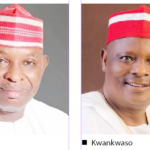The President of the Nigeria Labour Congress (NLC), Joe Ajaero, says masses are the losers of President Bola Tinubu’s economic reforms.
He stated this in Abuja on Thursday during the 21st Daily Trust Dialogue with the theme ‘Tinubu’s Economic Reforms: Gainers and Losers.’
The labour leader, who was referring to the federal government’s twin policies of the petrol subsidy removal and the currency floating, said it was not too early to measure the indices of failure as well as that of winning.
Ajaero said the Nigerian masses were the losers because they were once buying petrol at N187 per litre, but now doing so at N700 per litre.
He said “It took former President Muhammadu Buhari eight years to move from N260/dollar to N700/dollar, within six months, it moved from N700/dollar to N1, 350/dollar under Tinubu. So, who are the losers?.
TRUST DIALOGUE: Bullion vans carry money from gov’t houses to BDCs – ex-Deputy Gov
TRUST DIALOGUE: Leaders Turning us To Guinea Pigs Of Experiments – Shehu Sani
According to him, the masses are suffering because there is no increase in salaries and wages.
He described the government’s policy in the oil and gas and power sector as “Public disaster and private gain.”
He wondered why the government would still be giving more money all in the name of subsidy to private investors whom it sold the power sector to at what he termed “ridiculous amount”.
“All of these happenings are a situation of “Public disaster and private gain. We are living in a prodigal economy and 99 per cent, if not 100 per cent, of privatised companies in Nigeria have failed.
“The country has been on an increasing debt journey. Who do you think will pay it? I know they tell you that you have to suffer a bit so you can gain, but it has been the same story since forever,” he said.
Ajaero further stated, “When policies come with the toga of reformation, it immediately adorns the garb of the pristine, creating the belief that it is geared towards generating better structures and platforms for social progress.
“Tagging all policies as reformatory can, therefore, be deceptive at times meaning that it is our responsibility to query and interrogate such arrogation from time to time.
“Whether we can, therefore, call Tinubu’s economic policies reforms or deforms is completely dependent on the outcomes or impact of such policies on the people.
“For example, do the people have greater access to food and nutrition; decent housing, quality health care or in general has the quality of life of the citizenry improved both in the short, medium and in the long term or has it stagnated or worsened? Those are some of the indices that will define how we can classify such policies.
“Tinubu administration, driven by neoliberal principles as dictated to it by its two chief priests or do we call them the twin altars – the World Bank and the International Monetary Fund (IMF) embarked on a series of economic reforms upon assuming office in May 2023.
“These reforms were ostensibly designed to address perceived fiscal challenges and promote economic sustainability. However, the policies implemented have been met with mixed reactions, with both positive and negative consequences for different segments of the population.
“Important to state is the fact that the key policy of the hasty hike in the price of petrol does not fit into the procedure for carrying out a reform, especially when we expect such reforms to have a serious positive impact on the economy.
“We would, therefore, examine some of the identified actions that this government has taken to see whether there is a pattern or a coherence that points to specific directions as to the results that are intended and whether these policies are capable of taking Nigerians to the stated destinations.
“We will make haste to immediately state that what has been implemented as policies thus far are not new to Nigeria economic gerrymandering. They have all been tried severally in the past with the same result, which most of us here have experienced.
“If we are, therefore, expecting a different result from what we have experienced before, we fall into the fabled trap of doing the same thing, the same way over and over and expect a different result. What is it that they call it again?
Ajaero alleged that some of the present administration’s policies were inconsistent, saying such policies had heightened pervasive threats of massive kidnappings, abductions and banditry across the country.
“Some of this administration’s key economic decisions since inauguration could be summed up in the following: Hike in the price of petrol, devaluation of the Naira, freeing the foreign exchange market to merge all the windows, fiscal expansion and increasing the debt stock through more borrowings.
“In any case, in the surreal landscape of a nation grappling with escalating insecurity, discussing the intricacies of a government’s economic policies seems akin to debating the colour of curtains in a burning house.
“The pervasive threat of massive kidnappings, abductions and banditry casts an ominous shadow over the very fabric of society, rendering economic discourse almost absurd in the face of urgent and life-threatening crises.
“While economic stability is undoubtedly a crucial aspect of governance, the stark reality of citizens living in constant fear, with lives upended by the heinous acts of criminals, demands immediate attention and action.
“Who will invest in such an environment except looters and plunderers? In such a climate, the absurdity lies in the stark disconnect between bureaucratic discussions on fiscal policies and the visceral, pressing needs of a populace caught in the crossfire of insecurity.
“Citizens find themselves torn between the hypothetical benefits of economic strategies and the tangible, immediate threats to their safety and well-being.”
Ajaero said the urgency of addressing the security crisis is a stark reminder that in the hierarchy of priorities, the protection of life and liberty takes precedence over economic debates, “Challenging the very essence of governance in times of profound adversity.
“Whether there is a coherent economic strategy by the present administration to deal with the challenges confronting our nation given the absence of a discernible economic blueprint is another question altogether.
“It may, therefore, be stretching it a bit too far if we categorise such decisions taken in silos as reformatory without the required coherence and structures including stated plausible destinations.”
He concluded by saying that companies are closing down and there is growing unemployment in the country, “So we need policies to keep people in their jobs and not the other way around”.

 Join Daily Trust WhatsApp Community For Quick Access To News and Happenings Around You.
Join Daily Trust WhatsApp Community For Quick Access To News and Happenings Around You.


